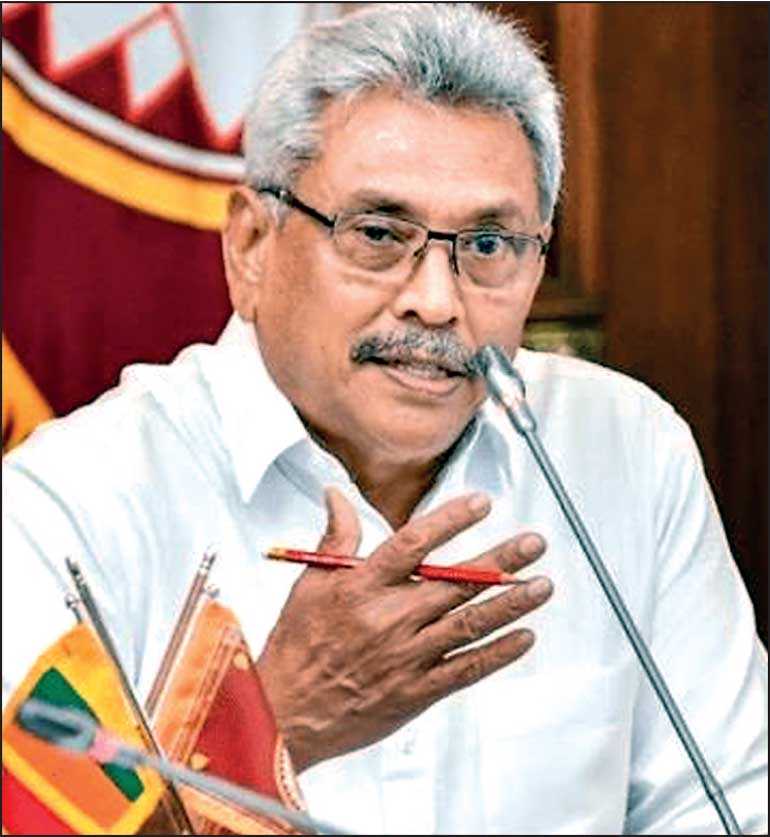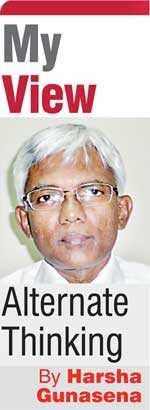Thursday Feb 12, 2026
Thursday Feb 12, 2026
Friday, 1 January 2021 00:00 - - {{hitsCtrl.values.hits}}

The election campaign of GR was designed aiming at the votes of majority Sinhala Buddhists. It was the ideology of Mahinda Rajapaksa camp as well in 2015 Presidential Election where they failed. In this instance GR succeeded. He acknowledged that in his inaugural speech as well. However, unlike to the previous Heads of State, GR seems to be ignoring the interests of the minorities altogether
At the Presidential Election of 2005, Mahinda Rajapaksa (MR) had a narrow victory over Ranil Wickremesinghe with a majority of 180,000 votes. Ranil Wickremesinghe who spearheaded the peace  talks had the support of the moderate Tamil people. Prabhakaran ordered Tamil people not to vote at the Presidential Election.
talks had the support of the moderate Tamil people. Prabhakaran ordered Tamil people not to vote at the Presidential Election.
Hence the victory of MR was secured. MR did not have initial plans to end the conflict by war, but the circumstances led him to take that route. It was Prabhakaran who blocked the Mavil Aru dam and created the conditions for the war. MR had given the political leadership to the war and he had a good team to perform that task. Hence Prabhakaran selected his Waterloo.
The Sinhala Buddhist ethnocentrism was the creator of the conditions of the ethnic conflict and thereby the 30-year long war. Ethnocentrism of Sri Lanka has come to its peak with the Presidency of Gotabaya Rajapaksa (GR).
Ethnocentric actors in the Government are bringing that ideology in to the level that they antagonise the right-thinking locals as well as the international community. As all the previous two-thirds majority governments thought and acted, they too think they can do whatever they want.
There are signs that Sinhala Buddhist ethnocentrism has selected its Waterloo by appointing GR as the President and giving him two-third majority in the Parliament. The sad part is that all the citizens of Sri Lanka will have to face the consequences.
Sinhala Buddhists in this country guided by the Buddhist way of life, had big hearts over the centuries in ethnic relationships. Although at present, the ethnicity, religion and caste are considered as a prerequisite for national leadership, in the history we had kings with different ethnicities with the concurrence of the people in several instances.
They were not invaders who grabbed the power by force although we had a number of such kings. For example, Nissanka Malla who ruled the country for nine years (1187-1196) in the Polonnaruwa era was not of Sri Lankan origin. This practice maintained by us over millennia was closer to that of current democracies.
Examine the status of India in this respect. Practicing Buddhism was mixed with Hinduism from the Polonnaruwa era onwards. Even in today there is no difference. Muslims of Sri Lanka had a very good relationship with the kings and the people for about a millennium until the 1915 riots to which Buddhist revival program in the late 19th century also contributed indirectly.
The status of ethnocentrism in the past
There were instances that the mosques were built in temple land and they were fulfilling their ‘rajakariya’ at temples including the Dalada Maligawa. It was the Sinhala Buddhists and their kings who protected Roman Catholics from Protestants during the Dutch rule in coastal areas.
Ananda College where GR was educated was started as an English Buddhist school, emphasising on the religion and not the ethnicity to counter the maltreatment received by the Buddhists from the State. The movement was against the oppressor and the oppression. There were a number of Tamil and Muslim teachers at Ananda.
The vision of the forefathers of Ananda and the legendary Principal P. De S. Kularatne was not against other religions but against the undue oppression of Buddhism by the State. Kularatne encouraged T.B. Jayah who was a teacher at Ananda to take over the leadership of Zahira College and also sent several teachers from Ananda to Zahira.
That was perfectly in line with his vision and the vision of Ananda. Ethnicity came into Ananda College during the time of L.H. Mettananda and by the time GR was educated there, it was transformed to a mere Sinhala Buddhist school, undermining the spirit of the great struggle spearheaded by Ananda College against the oppression.
The election campaign of GR was designed aiming at the votes of majority Sinhala Buddhists. It was the ideology of Mahinda Rajapaksa camp as well in 2015 Presidential Election where they failed. In this instance GR succeeded. He acknowledged that in his inaugural speech as well. However, unlike to the previous Heads of State, GR seems to be ignoring the interests of the minorities altogether.
This dirty game of bringing ethnicity and religion to politics was introduced by S.W.R.D. Bandaranaike but he knew what was just and fair and that was why he entered into the Bandaranaike-Chelvanayakam pact. He did not have a back bone to defend it.
GR seems to be honest compared to his predecessors, including his brother, and for him it was not just an election rhetoric. Probably he might be thinking of the fate of SWRD. What is most probable is that he wants to hold onto the so-called winning formula in the light of deteriorating popularity, but it is fast becoming the defeating formula.
Respecting the views of others
Ethnocentrism, the guiding star of the GR presidency started to play havoc. For instance, we can take the issue of the cremation of the dead bodies affected by COVID-19 can be considered. It was reported that neither the Cabinet nor the Foreign Ministry were aware of the request by Sri Lanka to bury the bodies of Sri Lankan Muslims affected by COVID-19 in Maldives.
It was the President who requested that. When I heard about the request, I felt ashamed since he was our President. What a mentality to have that type of request from a foreign country. If we compare our President with the Prime Minister of New Zealand, what a gap we see in relation to empathy.
There is enough evidence put forward by the medical professionals supporting the burial. There are WHO guidelines supporting the burial. There are human rights guidelines supporting the burial. I do not believe that my body should be buried when I am dead but if someone believes that it should be the case, I wholeheartedly support that.
This democratic principle of respecting the views of the others especially who represent views of small groups or of minority ethnic and religious groups is alien in the ethnocentric ideology. All of them are more concerned of the spread of the virus from dead bodies and are blind to the ineffective control of spreading of the virus from live bodies.
Hence, they are not really concerned of the spread of virus but want to counter the belief that the dead bodies should not be cremated. If the science says that the bodies affected by the disease should be cremated those should be cremated and if the science says that the bodies affected by the disease should be buried those should be buried irrespective of their beliefs.
The people of this country should understand that nationalism or patriotism is not ethnocentrism. People should have their ethnic identities, but nationalism is much broader. Humanity is the broadest. In the present day certain political leaders look beyond nationalism. GR and his counterpart in India are with ethnocentric ideals.
Narendra Modi is destroying the secular ideals carefully built up by Mahatma Gandhi and trying to uplift the values of Vinayak Savarkar, the forerunner of Hindutva movement. He can do it in the short run and the repercussions will be in the long run to be faced by a new generation.
He can do it since his party is stronger and the country is stronger. Donald Trump did a similar thing in the US against the liberal ideals evolved over centuries and he had to get his term limited. Sri Lanka cannot do it since the country is weaker.
The state of the current economy
The economy of the country is in doldrums due to bad financial management and corruption of successive governments and of cause with COVID-19. Fiscal consolidation is the key to stabilisation of a country in the situation of Sri Lanka which was initiated by Ranil Wickremesinghe Government with much criticism of the private sector which is concerned of their pockets only like all the stakeholders in Sri Lanka.
This Government has abandoned it. They were so keen to throw it away altogether and, in the run, they have abolished the PAYE as well which was not a tax but a mode of collecting a tax in advance. The private sector did not utter a word. Downgrading by Rating Agencies causing higher interest rate for sovereign borrowings amid the pandemic could have been countered if the country were progressing towards fiscal consolidation.
We would be able to see the fireworks with the introduction of the new Constitution minus the Provincial Councils which will provoke the minorities as well as India which is firmly aligned with the US. The incoming Biden administration will closely work with its allies including the EU and Britain where our export market is. The myopic thinkers of the GR camp will push the country towards China, of which the autocratic and unaccountable governing system is the desire of that camp.
The performance of the Government and especially the President is disastrous. Most of the time what the Government says in defence of its actions are ridiculous.
The country needs a course correction at this point. The country was governed by dishonest leaders over a period. Rebellions were launched against them unsuccessfully and the society did not learn lessons out of that. It is going in the same track.
After 72 years of independence, we do not have a Constitution acceptable to all. Having centralised the power vertically, the new Constitution which is going to be introduced would be the most disastrous one with centralisation of power horizontally as well.
There is a need of restructuring the current systems of governance, Judiciary, and public service. Therefore, we should start the preparation of a Constitution which would be the forerunner of a people’s movement aimed at changing the direction of the country. This would be an alternative to short term objectives of the politicians of grabbing the power next time.